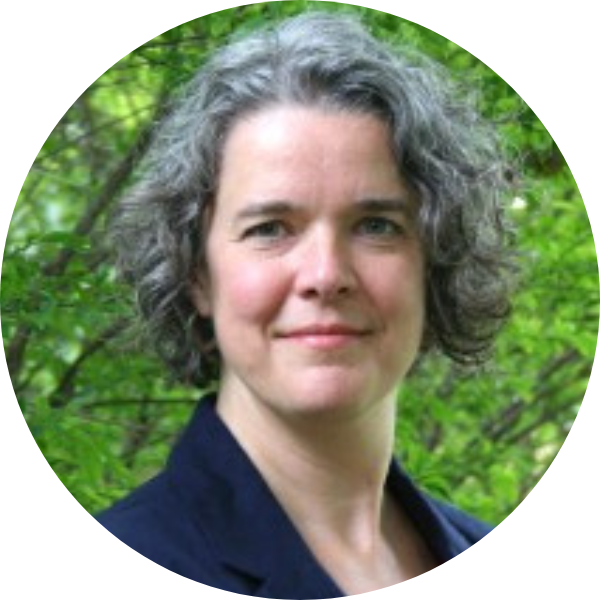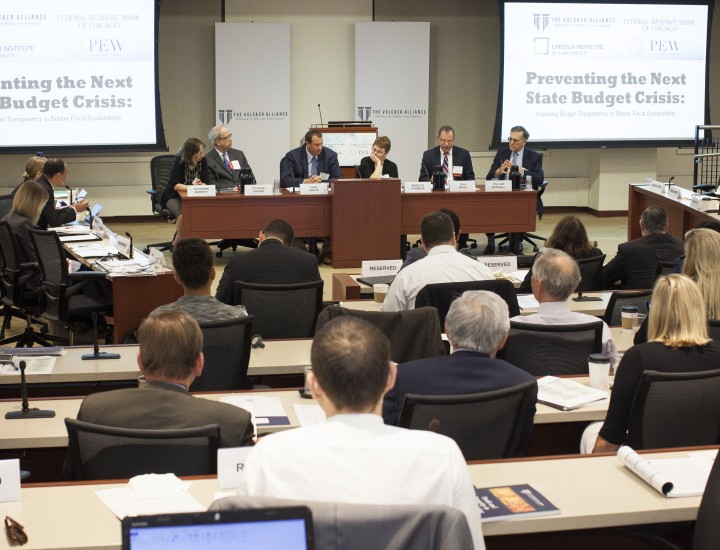Special Briefing: Revitalizing Downtowns by Turning Offices Into Homes

11:00AM
With working from home persisting even as the COVID-19 pandemic wanes, the Volcker Alliance and Penn Institute for Urban Research hosted an online Special Briefing on Revitalizing Downtowns by Turning Offices Into Homes. Attracting more people back to center cities to live as well as work is the key to increasing street life, bolstering commerce, and preventing further losses in municipal property and sales tax revenues.
Moderated by William Glasgall, Volcker Alliance senior director, public finance and Penn IUR fellow, and Susan Wachter, co-director of Penn IUR, this briefing is the fortieth in a series of sixty-minute online conversations featuring experts from the national research networks of the Volcker Alliance and Penn IUR, along with other leading academics, economists, and federal, state, and local leaders.
Special Briefings are made possible by funding from The Century Foundation, the Volcker Alliance, and members of the Penn IUR Advisory Board.
Recordings of the entire Special Briefings series are available on the Volcker Alliance website: SPECIAL BRIEFING SERIES ARCHIVE.
Be sure to subscribe to the Special Briefing podcast, available on Apple Podcasts, Spotify, Google Podcasts, Stitcher, TuneIn, iHeart Radio and more.
Special Briefing Episode Summary:
Cities Turn to Office-to-Apartment Conversions to Revitalize Downtowns
By Stephen Kleege, Volcker Alliance Special Project Consultant
- Pandemic spurs cities to rethink single-use office districts
- New York City aims to add 20,000 apartments in converted office buildings
- Washington mayor sets goal to convert 7 million square feet of offices for 15,000 new residents
- Conversions seen as solution for Class B offices, after values drop 70 percent
- Conversions require subsidies, eased regulations, advocates say
Conversions of office buildings into homes are key to reviving urban downtowns and protecting municipal tax bases after pandemic related work-from-home arrangements slashed demand for downtown commercial property, panelists said at a special briefing hosted by the Volcker Alliance and the Penn Institute for Urban Research.
“A lot of office buildings, in particular the more obsolete office buildings, have been struggling in terms of reaching occupancy levels that existed before the pandemic,” said Maria Torres-Springer, New York City’s deputy mayor for economic and workforce development, who keynoted the March 30 webinar. She said adapting office space for residential use could bolster property values while helping address an affordable housing crisis. The effort requires partnership among state and city officials on everything from zoning and land use regulations to tax incentives, she said. “We have to make those courageous choices,” she said, so the city can “not just recover from the pandemic but really thrive in its wake.”
Moderated by William Glasgall, Volcker Alliance senior director, public finance and Penn IUR fellow, and Susan Wachter, co-director of Penn IUR, the briefing was the fortieth in a series of sixty-minute online conversations featuring experts from the national research networks of the Volcker Alliance and Penn IUR, along with other leading academics, economists, and federal, state, and local leaders.
In addition to Torres-Springer, panelists included Stijn Van Nieuwerburgh, Earle W. Kazis and Benjamin Schore professor of real estate and professor of finance, Columbia University Graduate School of Business; Heather Long, columnist and Editorial Board member, Washington Post; and Amy Cotter, director of climate strategies, Lincoln Institute of Land Policy.
New York Mayor Eric Adams and Governor Kathy Hochul recently convened a task force of sixty experts to come up with what Torres-Springer called “a very concrete initiative: transforming what had been relatively single-use business districts into great places where people can work and play, strengthening employment hubs across the five boroughs.”
Office-to-apartment conversions could bring 20,000 new homes to the market, as the mayor pursues a “moonshot goal” of building 500,000 new homes in New York City over the next decade, Torres-Springer said. The task force identified more than one hundred rules and processes that should be streamlined to help speed housing production, including state regulations that need to be modified to enable conversions, she said.
Van Nieuwerburgh said that commercial property owners face a combination of economic and regulatory headwinds that have reduced the value of a typical Class B office building, which may be older or lack the amenities of fancier structures, by about 70 percent. “Office-to-apartment conversions are a very natural solution,” he said, noting that they are also expensive. “We need to bring in the government to help subsidize this,” he said, adding that modest tax abatements may be enough to make conversions viable. About $22 billion may be available to support conversions under environmental provisions of the Inflation Reduction Act of 2022, Van Nieuwerburgh said.
Washington Mayor Muriel Bowser has set a goal of 15,000 new downtown residents in the next five years, which would require the conversion of 7 million square feet of office space, Long said. Thus far, developers have purchased and plan to convert only about 1 million square feet. Long said a study by Gensler, a global architecture, design, and planning firm, found that only 30 percent of office buildings, at most, are logical candidates for conversion, so cities should pursue strategies in addition to residential conversion. Washington is depending on expansions of universities and other institutions to offset the drop in demand for office space, she said.
Cotter emphasized the importance of cooperation between cities and states, as they adapt downtowns to meet the needs of today’s work-at-home professionals, with an eye toward environmental sustainability.
“Cities are a creature of state government,” Cotter said. “States set the sources and rules by which cities can raise revenue, by which they can use redevelopment tools such as zoning flexibility. So that fiscal relationship and that partnership is really an essential element of redevelopment of downtowns.”

Maria Torres-Springer is the NYC Deputy Mayor for Economic and Workforce Development, charged with spearheading the administration’s efforts to strengthen and diversify its economy, invest in emerging industries, bolster small business, connect New Yorkers to family-sustaining jobs, and expand access to arts and culture. She previously was Vice President of US Programs at the Ford Foundation where she oversaw the foundation’s domestic grant making and made historic investments to support racial equity, workers’ rights, voting rights, and arts and culture across the country. As commissioner of the NYC Department of Housing Preservation and Development, Maria focused on the production of housing for the city’s most vulnerable communities, while also launching several new programs to protect tenants’ rights. She led the implementation of Housing New York, a five-borough, 12-year plan to create or preserve 300,000 affordable homes; and she steered the financing of approximately 60,000 affordable homes. Earlier, as president and CEO of New York City Economic Development Corporation, Maria led the implementation of the new citywide ferry service and made major investments in key sectors of the city’s economy. She also spearheaded several neighborhood revitalization plans. Prior to that, as commissioner of the NYC Department of Small Business Services, Maria prioritized efforts to raise wages and support women and immigrant-owned businesses and worked to prepare New Yorkers for 21st-century jobs. Maria earned her bachelor's degree in ethics, politics, and economics from Yale University and a master’s in public policy from the Kennedy School of Government at Harvard University. She lives in Brooklyn with her husband and two daughters.
 Stijn Van Nieuwerburgh is the Earle W. Kazis and Benjamin Schore professor of Real Estate and professor of Finance at Columbia University’s Graduate School of Business, which he joined in July 2018.
Stijn Van Nieuwerburgh is the Earle W. Kazis and Benjamin Schore professor of Real Estate and professor of Finance at Columbia University’s Graduate School of Business, which he joined in July 2018.
His research lies in the intersection of housing, asset pricing, and macroeconomics. One strand of his work studies how financial market liberalization in the mortgage market relaxed households' down payment constraints, and how that affected the macro-economy, and the prices of stocks and bonds. In this area he has also worked on regional housing prices, households’ mortgage choice, commercial real estate price formation, the impact of foreign buyers on the housing market, and mortgage market design.
Professor Van Nieuwerburgh has published articles in the Journal of Political Economy, American Economic Review, Econometrica, Review of Economic Studies, Journal of Finance, Review of Financial Studies, Journal of Financial Economics, and the Journal of Monetary Economics, among other journals. He is Editor at the Review of Financial Studies. He is a Faculty Research Associate at the National Bureau of Economic Research and at the Center for European Policy Research.
He has served as an advisor to the Norwegian Minister of Finance, and has been a visiting scholar at to the Central Bank of Belgium, the New York and Minneapolis Federal Reserve Banks, the Swedish House of Finance, and the International Center for Housing Risk, and has contributed to the World Economic Forum project on real estate price dynamics.
Professor Van Nieuwerburgh was awarded the 15th Edition of the Bérnácer Prize for his research on the transmission of shocks in the housing market on the macro-economy and the prices of financial assets. The Bérnácer Prize is awarded annually to a European economist under the age of 40 who has made significant contributions in the fields of macroeconomics and finance.
 Amy Cotter grew up with a corn field in her backyard and the city in her blood. Several degrees and over 25 years later, she now works to improve both city and country and to help them coexist more harmoniously. In her current position, she relates land policy and planning in metropolitan and urbanized areas to the critical global challenges of climate resilience, sustainability, and spatial equity. She is responsible for Lincoln’s work on climate change, planning practice, and scenario planning, and is a key advisor on its work related to legacy cities. Immediately before joining the Lincoln Institute in 2015, Amy spent 13 years with the Metropolitan Area Planning Council in Boston. There, she directed development and strategic implementation of MetroFuture, the plan for a more sustainable and equitable metropolitan region. Amy has also held positions at the Tellus Institute and ICF Consulting and earned an M.S. in environmental policy, an M.U.P. in urban and regional planning from the University of Michigan, and a B.A. from Tufts University.
Amy Cotter grew up with a corn field in her backyard and the city in her blood. Several degrees and over 25 years later, she now works to improve both city and country and to help them coexist more harmoniously. In her current position, she relates land policy and planning in metropolitan and urbanized areas to the critical global challenges of climate resilience, sustainability, and spatial equity. She is responsible for Lincoln’s work on climate change, planning practice, and scenario planning, and is a key advisor on its work related to legacy cities. Immediately before joining the Lincoln Institute in 2015, Amy spent 13 years with the Metropolitan Area Planning Council in Boston. There, she directed development and strategic implementation of MetroFuture, the plan for a more sustainable and equitable metropolitan region. Amy has also held positions at the Tellus Institute and ICF Consulting and earned an M.S. in environmental policy, an M.U.P. in urban and regional planning from the University of Michigan, and a B.A. from Tufts University.
 Heather Long is a columnist and member of the Washington Post's Editorial Board. She was formerly US economics correspondent from 2017 to 2021 and played a large role in identifying and covering the K-shaped recovery from the pandemic and the Great Reassessment of work. Before joining The Post, she was a senior economics reporter at CNN and a columnist and deputy editor at the Patriot-News in Harrisburg, PA. She also worked at an investment firm in London.
Heather Long is a columnist and member of the Washington Post's Editorial Board. She was formerly US economics correspondent from 2017 to 2021 and played a large role in identifying and covering the K-shaped recovery from the pandemic and the Great Reassessment of work. Before joining The Post, she was a senior economics reporter at CNN and a columnist and deputy editor at the Patriot-News in Harrisburg, PA. She also worked at an investment firm in London.
She was a finalist in the won the list, Gerald Loeb Award for Breaking News in 2020 and the Gerald Loeb Award for Breaking News in 2018. She is vice president of the Society for Advancing Business Writing & Editing and received a B.A. in economics and English from Wellesley College and a master's in financial economics and medieval literature from Oxford University.


